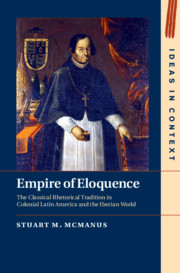 Empire of Eloquence
Empire of Eloquence Published online by Cambridge University Press: 09 April 2021
Chapter 4 addresses the role of the classical rhetorical tradition in bolstering Iberianized Catholicism among native converts in Paraguay and Portuguese India. By taking a connected and comparative approach to the application of the classical rhetorical tradition by Jesuit missionaries and its reception by native audiences both in the Americas and in coastal western India, this chapter argues that classical rhetoric shaped Konkani-language missionary oratory much more than Nahuatl, Quechua and Guarani examples, and offers a possible explanation based on the social and caste structures of the two contexts. In so doing, this chapter places Latin American ethnohistory in a new meta-geographical context, and argues for the important constitutive role played by non-European languages, peoples and cultural practices in the Iberian World.
To save this book to your Kindle, first ensure no-reply@cambridge.org is added to your Approved Personal Document E-mail List under your Personal Document Settings on the Manage Your Content and Devices page of your Amazon account. Then enter the ‘name’ part of your Kindle email address below. Find out more about saving to your Kindle.
Note you can select to save to either the @free.kindle.com or @kindle.com variations. ‘@free.kindle.com’ emails are free but can only be saved to your device when it is connected to wi-fi. ‘@kindle.com’ emails can be delivered even when you are not connected to wi-fi, but note that service fees apply.
Find out more about the Kindle Personal Document Service.
To save content items to your account, please confirm that you agree to abide by our usage policies. If this is the first time you use this feature, you will be asked to authorise Cambridge Core to connect with your account. Find out more about saving content to Dropbox.
To save content items to your account, please confirm that you agree to abide by our usage policies. If this is the first time you use this feature, you will be asked to authorise Cambridge Core to connect with your account. Find out more about saving content to Google Drive.